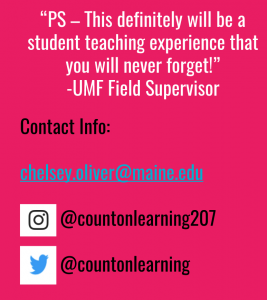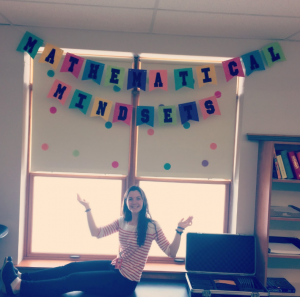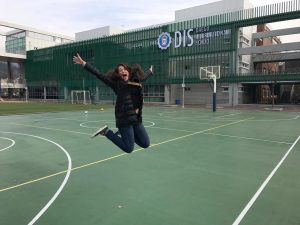It can be nerve wracking or even intimidating to go into your Student Teaching placement. There are a lot of expectations that you need to follow, assignments to complete, and a lot to learn. When you begin your Student Teaching, it’s important to prepare what you can early on and to think about what else is expected of you. Below are some tips to help you transition into your Student Teaching placement:
Prepare for each week in advance- Don’t wait until Monday to prepare everything you need for the week. Plan your outfits, the time you’ll leave your house by, what you’ll bring for lunch and snack every day (which you will definitely need!). If you plan all of these in advance, you will be less frantic come Monday morning.
Research the school & area- Know what grades and what regions your school serves. Learn about the extracurricular activities offered at school and in the community. Find out what resources are available, and become more familiar with what your students do when they are not at school. Knowing where your students come from and what they have available to them will better help you plan your instructions and interactions.
Prepare for your lessons to fail- You cannot always predict how a lesson will go or how the students  will react to the lesson. Sometimes, the lesson just does not work, and that is okay. But it is important to have a backup lesson or activity to supplement the lesson and to keep students on task and engaged during valuable classroom time.
will react to the lesson. Sometimes, the lesson just does not work, and that is okay. But it is important to have a backup lesson or activity to supplement the lesson and to keep students on task and engaged during valuable classroom time.
Know the expectations- Find out what is expected of you as a student teacher from both your mentor, your students, your placement school, and from your UMF Field Supervisor. Also, relay your expectations. Let your mentor know what you will need from them to be successful, outline your expectations about behavior and respect to your students, and express any concerns you have to either your mentor or your field supervisor.
 Make connections and learn from others- There are TONS of websites, Instagram pages, Twitter accounts, blogs, etc. that are for teachers, by teachers. You can find a variety of lesson plan ideas, classroom management tips, accommodations, tools, activities, and resources for teaching all ages. UMF alumna Chelsey Oliver took advantage of sites like these during her student teaching experience, and took it upon herself to create her own education inspired Twitter and Instagram pages- feel free to check them out!
Make connections and learn from others- There are TONS of websites, Instagram pages, Twitter accounts, blogs, etc. that are for teachers, by teachers. You can find a variety of lesson plan ideas, classroom management tips, accommodations, tools, activities, and resources for teaching all ages. UMF alumna Chelsey Oliver took advantage of sites like these during her student teaching experience, and took it upon herself to create her own education inspired Twitter and Instagram pages- feel free to check them out!
Stay organized and on top of your assignments- Start planning lessons ahead of time so that you can go back and make changes as the lesson approaches. Relay any deadlines that you need to meet to your mentor so that they can ensure you are getting what you need when you need it. Once you start to fall behind, it can be much harder to catch back up.
Take notes and ask questions- Your mentor teacher is there to model for you and to provide feedback. Take notes on the techniques and language they use, the way they manage their classroom, what you think works and does not work. Also take notes on student behavior, as you may notice patterns that can be valuable in addressing classroom management skills.
works and does not work. Also take notes on student behavior, as you may notice patterns that can be valuable in addressing classroom management skills.
Enjoy the experience- While Student Teaching is a lot of work, it should be an enjoyable and rewarding experience. Form relationships with students and have fun with them, take advantage of all of the opportunities presented, and make it unique to you! Take it all in and relish the experience, it goes by fast, and it will be over before you know it!
It won’t be easy, but it will definitely be worth it! You have spent the past few years preparing for this, learning from professors, and dipping your toe in the water in practicum placements. Now it’s time to dive in and immerse yourself into the classroom as an active Student Teacher. We know you will all shine and do great. From all of us here at UMF, good luck and have fun!


 The University of Maine at Farmington currently has four teacher candidates conducting their student teaching at the Daegu International School in Daegu, South Korea. The Daegu International School (DIS) has a partnership with UMF that allows students to conduct their student teaching internationally while meeting all of the requirements to receive their degree. Tori Lands and Kayla Girardin were able to share their experience and discuss various challenges, opportunities, and stores from their experience.
The University of Maine at Farmington currently has four teacher candidates conducting their student teaching at the Daegu International School in Daegu, South Korea. The Daegu International School (DIS) has a partnership with UMF that allows students to conduct their student teaching internationally while meeting all of the requirements to receive their degree. Tori Lands and Kayla Girardin were able to share their experience and discuss various challenges, opportunities, and stores from their experience.
 e most interesting. Maine is not as diverse as DIS, as Tori has students in her classroom from Korea, America, China, the Philippines, Japan, Australia- just to name a few. The diversity in her classroom has allowed her to learn from her students as well. “Instead of just reading about different cultures and countries these students can share personal stories and experiences,” Tori said. “It has been challenging to make sure I am sharing content in a way that makes sense to all the different learners in my classroom and making U.S. history relevant to students who may have only been to the states once or twice is interesting.” Both Tori and Kayla believe the cultural experience that students gain when teaching abroad has been much richer than teaching at home in the states.
e most interesting. Maine is not as diverse as DIS, as Tori has students in her classroom from Korea, America, China, the Philippines, Japan, Australia- just to name a few. The diversity in her classroom has allowed her to learn from her students as well. “Instead of just reading about different cultures and countries these students can share personal stories and experiences,” Tori said. “It has been challenging to make sure I am sharing content in a way that makes sense to all the different learners in my classroom and making U.S. history relevant to students who may have only been to the states once or twice is interesting.” Both Tori and Kayla believe the cultural experience that students gain when teaching abroad has been much richer than teaching at home in the states.